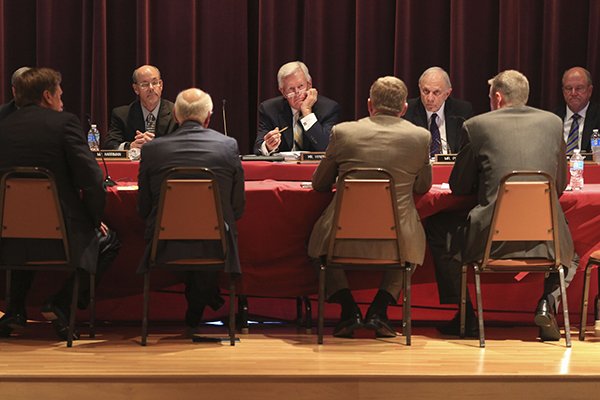FAYETTEVILLE -- Most everyone who has graduated college gets besieged with ceaseless demands to "give back" to build stuff, from athletics to zoology.
Universities so frequently have their hands out that some alumni might put their hands up as if they have been held up.
Suspicions worsen if there's cause to think some among the university's board of trustees can enhance their personal businesses via the university projects they approve.
Varying conflicts of interest are almost guaranteed among a board of prominent people. Some conflicts seem bigger than others.
Thursday's Arkansas Democrat-Gazette 1A story that University of Arkansas System trustees Reynie Rutledge, the CEO of First Security Bank; Kelly Eichler, whose husband, Brad Eichler, is an executive vice president of Stephens Inc.; and Morril Harriman, an attorney with the Mitchell Williams firm "have ties to businesses that stand to earn at least $195,800" from the Reynolds Razorback Stadium expansion project approved Friday.
Stephens Inc. and First Security are among the underwriters for the project's $120 million bond issue. The Mitchell Williams firm is legal counsel for the project.
By the actual voting outcome, Rutledge, Eichler and Harriman became moot points.
Of the 10 trustees, only David Pryor -- a former Arkansas governor and U.S. senator -- and Cliff Gibson -- an attorney from Monticello -- voted against it.
Still, future Arkansas governors and the trustees they appoint might have cause to pause on mixing any board member's business into UA's business, even if it means temporarily disqualifying some excellent businesses from doing business with the school.
Pryor always has been against the project he predicts will exceed the $160 million costs proposed, and he's also against the message he says it sends.
Many Razorbacks football ticket prices already have increased as it became apparent this project, mainly emphasizing increasing the stadium's 72,000 capacity to 75,000 with more luxury sky boxes, would pass.
Under since retired Arkansas athletic director Frank Broyles, the UA in 2001 expanded Razorback Stadium by 21,000 seats into Reynolds Razorback Stadium at a $110 million cost.
Pryor repeatedly has called this project a cost to be carried by many to benefit a privileged few.
Putting a greater onus on Razorbacks fans could affect the UA's equally voracious fundraising appetite to construct more buildings and pay for increased administrative staffing.
Meanwhile, UA tuition goes up. So do the student loans to pay the rising costs of a college education.
All good points that Pryor made but Athletic Director Jeff Long obviously knew wouldn't score.
Long and his staff, save for the Razorbacks marketing department, are headquartered at Walton Arena, long gone from the Broyles Center that will be demolished after this football season.
Sports on 09/10/2016

